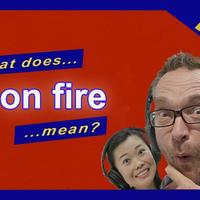What does 'on fire' mean? - YouTube
Feifei: Hello and welcome to The English We Speak,
I'm Feifei.
Neil: And I'm Neil! How are you today, Feifei?
Feifei: Yes, I'm well thanks – is everything OK
with you Neil? You seem very smug!
Neil: I'm doing great! I've had a very busy,
but very productive day – my most recent
video has reached 100,000 views, my new
project has been commissioned by a top
TV company, I've recorded and edited
three videos, written two scripts and now
I'm here in the studio recording with you.
Feifei: Wow! You are on fire today, Neil!
Neil: What? Fire! Where? Put it out!
Where's the extinguisher? Evacuate the
building!
Feifei: Woah! Just calm down there.
There isn't an actual fire. It's just an
expression!
Neil: Phew! Thank goodness! I thought
you were saying I was burning!
Feifei: Really, Neil! Just take a breath and
think before acting! When someone has
had a string of successes, we can say
they are ‘on fire'.
Neil: Ahhh, I get it. Shall we give some examples?
I can't believe my team have won ten
games in a row – they're on fire.
My friend is taking two extra classes and
I thought she'd be exhausted by now –
but she's on fire! She's getting really good
grades in every subject.
The actor was on fire in the early 2000s,
but his recent performances haven't been
to the same standard.
Feifei: This is The English We Speak from
BBC Learning English and we're talking
about the phrase ‘on fire'. Though this can
mean that something is burning, a more
informal use is to say that someone is
experiencing a series of successes,
one after another.
Neil: That's right, Feifei, so for example,
I've been on fire this month – I exceeded
all my targets at work and earned a bonus
for my success!
Feifei: That's great, Neil – congratulations!
Your work is on fire!
Neil: Hmmm, not quite, Feifei! That would
mean my scripts are burning! You can
only use this expression to describe the
person or people who are experiencing
success.
Feifei: Ah OK – so we can say a footballer
is on fire if he has scored lots of goals,
but we can't say his football is on fire.
Neil: That's 100% right, Feifei! It seems
we're both on fire today!
Feifei: I couldn't agree more, Neil! Join us
again for more The English We Speak. Bye!
Neil: Goodbye!

